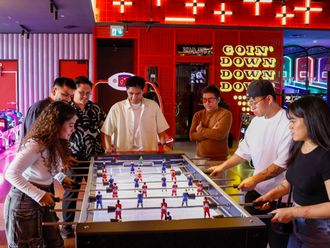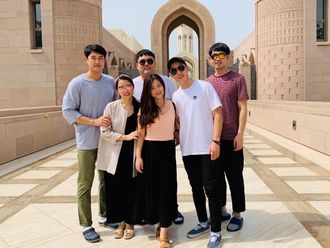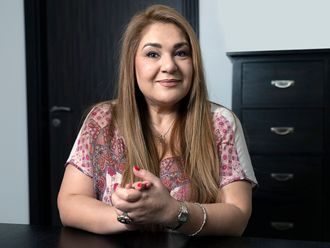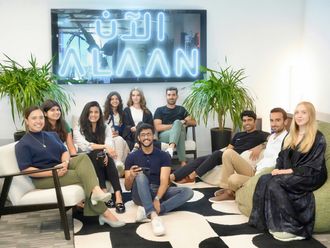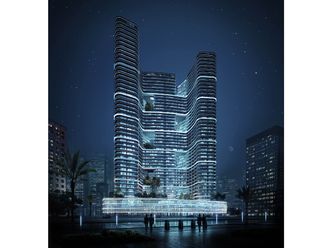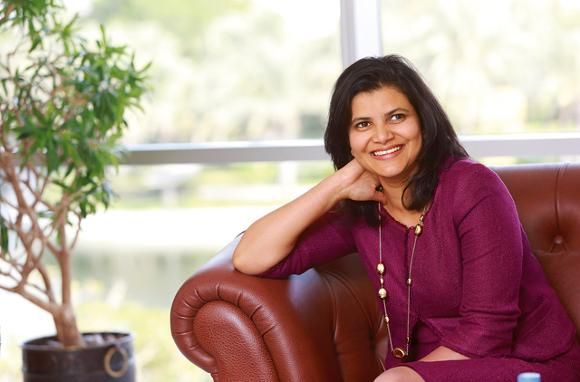
Shivani Pandya has walked the red carpet with the likes of Hollywood A-listers Tom Cruise, Colin Firth and Gerard Butler. But the managing director of the Dubai International Film Festival (Diff) is still not used to being in the limelight. Her body language – body slightly turned away from the Friday reporter – suggests that she’d rather be at her desk fine-tuning preparations for her beloved festival than sit and talk about herself.
The fact that Shivani loves her job is evident. She is proud when she says, “Diff has been quite an achievement for us. Over the last nine years we’ve seen it develop, and we’ve been an integral part of that development. Look at the number of films that are coming out the region and the exposure filmmakers get. That is really, really great.”
For Shivani, it’s no longer about putting Dubai on the film map. Instead, she’s looking to make Diff one of the top three film festivals in the world. But she’s not in a rush. “A slow and steady growth is what we are looking at,” she says. “An organic growth will be sustainable in the long run.”
But make no mistake, her ambition is there, and the will to realise her goals is palpable. “When industry people in the West want to make deals they should turn to Dubai,” she says. Here, Shivani reveals her work style and the dreams she has for herself and for Diff:
Work
I was influenced a lot by my parents, Kishu and Beena Pandya. While my father is a businessman, my mother is an artist so I have this curious mix of business and art in me. That perhaps explains why I am comfortable in both worlds. I studied sculpture for a while before majoring in economics. I hope to get back to art at some point.
I grew up in different cities in India – Kolkata, Delhi and Mumbai. It was a very multicultural, cosmopolitan upbringing, which helped me a great deal. I dabbled in quite a few things while growing up. I learnt art, studied economics in college, then communication. I did a course in photography, learnt a bit of classical dance, played sports... It was not that I got bored with any of them, rather, I kept discovering a lot of new, more interesting things, which I began to pursue fervently.
I started my career in advertising, but soon moved to United Television (UTV), a media production house where I learnt the ropes in production, mostly ad films and television. In time I headed up the production office in Delhi called United Studios Limited. Working with UTV founder and producer Ronnie Screwvala was wonderful because I learnt a lot from him. I moved to Dubai in 2001 – a time when Media City was being set up.
I was the 12th employee who was hired and was asked to head the broadcast department. It was exciting to work on a brand-new project. We started planning the first film festival, which was to open in 2004. The concept of a film festival was a natural development of what was happening in Media City. It was part of developing the film industry in Dubai and putting the emirate on the world film map. It was also about creating a really great cultural event for Dubai.
Initially, when we began talks with people in the film industry in the West, a lot of them didn’t even know where Dubai was. And some of them believed money grew on trees here! It was quite an educational process. A few years ago Bollywood wasn’t really interested in the Gulf. For them, foreign markets were the UK and the US. But that has changed. Now this region has become very important.
In those days we had to knock on doors, today they come to us. Diff has become a calendar event for a lot of people and what is heartening is that this transformation has happened in a relatively short period of time. The first year we had about 76 films and the small community of film people who attended were impressed with the development that was happening in Dubai.
The Dubai Film Market, which we later developed as a part of Diff, has helped develop the local film industry to a great extent. We co-finance projects where we have scriptwriters from Europe and from the Arab world on a programme that runs for six months. After that time, they present their finished scripts to interested producers at the Dubai Film Market.
We also run the Dubai Film Connection, a body set up to encourage co-productions. It’s been extremely successful and is now recognised the world over as a destination for films. We’ve kicked off about 85 projects so far – 22 have been completed and another 18 are in various stages of completion. We have supported around 35 co-productions with funding. Now we are concentrating on distribution of Arabic films.
Our films are being picked up for distribution in places like Australia where Arab cinema wasn’t very popular. Dealing with film industry personalities is very interesting. I consider film stars great talents and appreciate them for their work, and also for the kind of people they are. You get all sorts of people and you have to be patient with some. They are part of a creative industry and its different dealing with them as opposed to people in other industries.
My management style is to look at the big picture and then help everyone on the team figure out how to achieve a goal. I am a people person and am there for the team. People management can be quite complex when you have 25 regular staff and about 30 in various locations abroad. Come festival time, there’s suddenly 350 people on staff and another 700 volunteers. I like to lead by example, but also believe that you can learn something from everybody.
The Diff team has been working together for a long time, so we share a bond that is stronger than just that of office colleagues. All our key people have been with us right from the beginning. It’s like a family environment here. All of us have to believe in what we do and enjoy what we do or we won’t be able to do it properly. While I am tough when I have to be, I also believe in having fun while doing the job.
One of my strengths is the ability to remain calm while managing different kinds of situations, some of which can be highly stressful as we are dealing with different personalities and a large team of people. My other strength is the minute details of a job. This is very important. What I really enjoy about my job is that we’ve been able to create so many different aspects to the festival. Every year we add an extra element.
We have a charity aspect to the festival, supporting amfAR, the Foundation for Aids Research, and now we’ve added Oxfam. That’s why though I’ve been doing this for the last ten years, I am not bored in the least.
Play
I find it easy switching off from work mode. I just have to turn off my mobile phone and go to the beach, or even lounge around at home to relax. We work very long hours, so we have to be able to switch off when we can. I used to play golf, but that’s been on hold for some time as I just don’t have the time for it. It’s on my list of things to get back to once the festival is over.
I like reading and, of course, watching films. I am not always looking at films critically, as I am not involved in the artistic side. I enjoy all kinds of cinema and appreciate all genres. I am very practical person; the one thing I’d grab if my house was on fire is my passport.
Dream
I am a dreamer to a certain extent, so I can just pick up a book and be transported to a new locale. Or watch a movie and take off on a flight of fancy. When I used to do sculptures I was so committed that I would lose track of time. So I really hope to get back to it at some point in time. I would like to work on glass as a medium, and would like to take time off to study it.
I always dreamt of doing all sorts of things – from studying sculpture at the National Institute of Design in India, to studying higher economics. I accomplished some of them, and dabbled in others. Where Diff is concerned, we’ve put ourselves on the map and would like it to grow into the festival everybody just has to attend. We are headed towards that.




